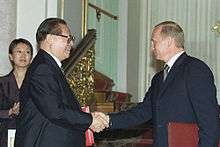2001 Sino-Russian Treaty of Friendship
The Treaty of Good-Neighborliness and Friendly Cooperation Between the People's Republic of China and the Russian Federation (FCT) is a twenty-year strategic treaty that was signed by the leaders of the two international powers, Jiang Zemin and Vladimir Putin, on July 16, 2001.
| 2001 Sino-Russian Treaty of Friendship | |||||||||||||
|---|---|---|---|---|---|---|---|---|---|---|---|---|---|
 Jiang Zemin and Vladimir Putin after signing the FCT | |||||||||||||
| Chinese name | |||||||||||||
| Simplified Chinese | 中俄睦邻友好合作条约 | ||||||||||||
| Traditional Chinese | 中俄睦鄰友好合作條約 | ||||||||||||
| |||||||||||||
| Russian name | |||||||||||||
| Russian | Договор о Добрососедстве Дружбе и Сотрудничестве Между Российской Федерацией и Китайской Народной Республикой | ||||||||||||
Overview
The treaty outlines the broad strokes which are to serve as a basis for peaceful relations, economic cooperation, as well as diplomatic and geopolitical reliance. Controversially, Article 9 of the treaty can be seen as an implicit defense pact, and other articles (A7 and A16) point at increasing military cooperation, including the sharing of "military know-how" (A16), namely, Chinese access to Russian military technology.
The treaty also encompasses a mutual, cooperative approach to environmental technology regulations and energy conservation; and toward international finance and trade. The document affirms Russia's stand on Taiwan as "an inalienable part of China" (A5), and highlights the commitment to ensure the "national unity and territorial integrity" in the two countries (A4).
Possible benefits
Analysts have attributed the motives behind, and perceived mutual benefit of, the FCT to several factors.[1]
China
- China wishes to develop and modernize its armed forces, much of which remain outdated. This process can be accelerated with Russian military training and technology.
- China wants to obtain a stable, consistent and affordable level of fuel shipments, especially petroleum. This goal can be better met with purchases and delivery of Russian oil, including the construction of an Eastern Siberia–Pacific Ocean oil pipeline.[2][3]
- China wishes to attain support for its stance on Taiwan.
Russia
- Russia strives to obtain sources of capital, which it is in need of following severe losses to international speculators during the process of Soviet dissolution. This effort can be significantly aided through the use of Chinese capital. Accordingly:
- Russia wants to find sources of employment for its skilled workforce.
- Russia wants to sell its military technology and expertise.
- Russia wants to sell its large reserves of petroleum and natural gas.
Economic competition with the US, Japan and the EU
The United States, Japan and the European Union are three economic powers who possess a skilled workforce and access to capital. Russia and the PRC can more effectively compete against these powers in the world economy, with Russia given access to Chinese capital and China given access to Russian training and technology.
See also
- BRIC
- Foreign relations of the People's Republic of China
- Foreign relations of Russia
- Sino-Russian relations
References
- "Archived copy". Archived from the original on 2006-05-13. Retrieved 2006-03-15.CS1 maint: archived copy as title (link)
- China, Russia to honor commitments on oil pipeline
- Putin: oil pipeline will serve China first
External links
- Text of the Treaty — Ministry of Foreign Affairs of the People's Republic of China
- "China, Russia Sign Good-Neighborly Friendship, Cooperation Treaty" — People's Daily
- "China, Russia Sign Good-Neighborly Treaty of Friendship, Cooperation" (details) — The Chinese Embassy in Norway
- "Anniversary of Sino-Russian Good-Neighborly Treaty Marked" — China Internet Information Center
- "China, Russia to promote military cooperation" — People's Daily
- Chinese, Russian leaders exchange new year's greetings" (2006) — Xinhua
- "Chinese president arrives in Moscow for state visit" (2005) — People's Daily
- "Hu: Sino-Russian ties enter a new phase" — Xinhua
- "Russian-Chinese border most problematic ecologically" — RIA Novosti
- ""Post-Cold War Sino-Russian Relations: An Indian Perspective"". Archived from the original on August 12, 2002. Retrieved March 24, 2008. — Institute for Defense Studies and Analyses
- "Challenges of the Sino-Russian Strategic Partnership" (PDF) — Center for Strategic and International Studies
- "Power Politics in Central Asia" — Harvard Asia Quarterly